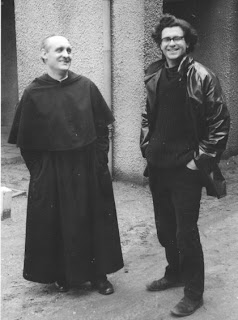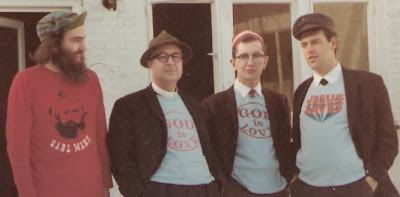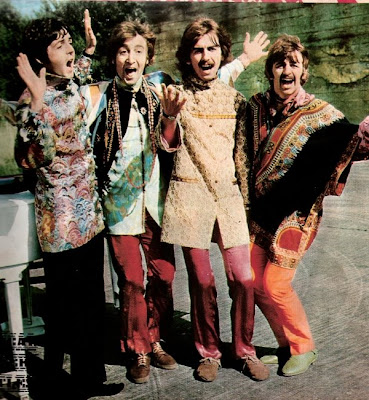Simon Barrow: People are as likely to be sceptical about the 'atheist bus' as they are about being sold religion:
This week the 'atheist bus' project finally gets wheels. After scrambling around for a few thousand quid, the money has finally come in to perambulate an inspiring message ('There's probably no God. Now stop worrying and enjoy your life') around our streets, bringing merriment to millions...
To those without a huge vested interest in promoting or dissing religion, this probably looks a slightly odd initiative. Frankly, the slogan is a bit anodyne. It's the non-believing equivalent of 'God may very well exist. Now have a nice day'. But it will probably still be enough to upset counter-evangelists of the kind who like to tell everybody they are going to hell for not subscribing to their particular doctrine, and who think atheism is very, very naughty.
Simon Barrow also comments about it in his blog FaithInSociety, and several others have also commented on it. In fact, so many people have commented on it that further commentary might seem to be redundant.
I tend to agree with Bishop Alan’s Blog: London Atheist ads: Shome mishtake?, when he says: "Perhaps this particular ad is more agnostic than atheist, and we still have to await a genuinely atheist poster ad."
But what interests me are the values expressed by the ad, which are assumed rather than explicitly promoted. They are not really atheist values, because there can be no specifically atheist values, since atheism is the absence of something. Atheists may have all kinds of values, and all kinds of reasons for holding them, but the values and the reasons for holding them owe nothing to atheism. Marxism-Leninism, for example, is strongly atheist, but the values it espouses are not based on atheism, but on a particular theory of economics and history. Ayn Rand, who detested Marxism-Leninism, and proposed an alternative, capitalist ideology, was also an atheist. One could multiply examples, but the point is clear -- there are no specifically atheist values.
I don't know whether the sponsors of the bus ad are calling what they are doing "evangelism". But "evangelism" means "spreading good news", and the sponsors clearly believe their message is good news and they are spreading it, so it is evangelism of a sort.
But what is the message that they intend to convey? And what is the message that people receive?
I can't speak for others, but I can say what message I receive from the ad. Whether it is what the sponsors intended to convey, I don't know. But if any of them read this, perhaps they can tell me if I've got it right or wrong. And if the intended message doesn't get across, then it means that there is either something wrong with the sender, or with the message, or with the recipient.
So what is the good news?
"Behold I bring you glad tidings of great joy: There is probably no God. Now stop worrying and enjoy your life".
And that sounds like another message I've been hearing a lot on TV lately:
"You only have one life, so make it a full one with world-class entertainment."
Both messages seem to have the same underlying values, the same basic message:
Eat, drink, and be entertained, for tomorrow we die.
The advertisements are being placed on British buses, so they will be read by rich and well-fed Westerners. Simon Barrow notes elsewhere (Cold water, buses and shared humanity | Ekklesia) that it raises interesting issues about "the extent to which the philosophy reflected in the bus slogan - ‘There is probably no God. Now stop worrying and enjoy your life’ - is widely shared (much more than many church leaders seem aware), and so on."
And yes, that philosophy is widely shared in prosperous Western societies, even if that prosperity is under threat of a recession.
And we see on TV how people "enjoy life" in Britain -- teenagers getting drunk. They send each other inane messages on their cell (mobile) phones, with scarcely a thought about the fact that in parts of the Congo armed groups are fighting to control access to coltan, one of the ingredients that makes such "enjoyment" possible, and that people, including teenagers and young children are being enslaved or killed as a result.
Will the message on British buses come across to people in strife-torn Congo as good news, so that they can "enjoy life", and have a full one, with "world-class entertainment"?
Oh yes, the message, the philosophy, of the slogan is widely shared in the rich West.
So how do I interpret it?
There is probably no God, so go ahead and enjoy your life, even if it is at the expense of other people. There is probably no God who cares about them, so you don't need to care about them either.
Forty years ago I was studying for a Christian doctrine exam, and instead of reading the text books for the course I read a book written by a Methodist minister in Zambia, Colin Morris. It was called Include me out: confessions of an ecclesiastical coward, and this is how it began:
The other day a Zambian dropped dead not far from my front door. The pathologist said he'd died of hunger. In his shrunken stomach were a few leaves and what appeared to be a ball of grass. And nothing else.
Colin Morris's book wasn't aimed at rich well-fed atheist evangelists, but rather at rich well-fed Christian ones, and at ecclesiastical bureaucrats, and he challenged them to think about how the message they put across, in words or deeds, in what they did and what they didn't do, could have come across as good news to "an ugly little man with a shrunken belly, whose total possessions, according to the police, were a pair of shorts, a ragged shirt, and an empty Biro pen."
There is probably no God, so it doesn't really matter if your leaders, using your taxes, rain down bombs on people in Yugoslavia, in Afghanistan, in Iraq, just so long as you continue to enjoy a full life, with world-class entertainment. There is probably no God who cares about them, so don't let their plight interfere with your enjoyment of life.
Some of the things Colin Morris said 40 years ago are just as valid today, and they apply to all rich well-fed evangelists, atheist as well as Christian, including me.
Much theological writing is a highly elaborate conspiracy against that little man with the shrunken belly and his skeletal brethren. It is an exercise in endless qualification, dedicated to showing why we cannot take the words of the Galilean Peasant at their face value or follow His example simply. Let some Manchester bus conductor murmur that he can follow the words of Jesus but cannot follow the words of some of the men who followed Him, and he will earn himself a lecture. This would be to the effect that Jesus cannot be understood except within the whole framework of the History of Salvation and that he did not actually say many of the words reported of him in the Gospels, so he must take our words for what is fact and fancy, because we know!
The biggest problem for Christians with the philosophy behind the bus advertising is not that it is unacceptable, but that its message of hedonism is accepted all too easily by so many Christians. Again, to quote Colin Morris:
Our failure towards the little people of the earth is more than a lapse of simple charity for which sincere contrition can atone. When our Churches have crumbled and our vestments have rotted and the wind blows through the ruins of our ecclesiastical structures, all that will stand and have eternal significance are creative acts of compassion -- the effectual signs of the presence of the Kingdom.
Because the Gospel is simple, the judgement is immediate. It awaits no historical summing up of all things. It can be put plainly and in first-person terms. I saw a starving man and there was no gnawing pain in my belly. I saw a hunchback and my own back did not ache. I watched a pathetic procession of refugees being herded back and forth sleeplessly, and I slept well that night.


![[schori_technicolor_yawn.jpg]](http://1.bp.blogspot.com/_RswS-wjevys/SPf6HbCizvI/AAAAAAAABT4/b76jkTuzq8M/s1600/schori_technicolor_yawn.jpg) Hat (aye, well, mmm) tip to Father David MacGregor of Port Elizabeth, who adds, in his own blog
Hat (aye, well, mmm) tip to Father David MacGregor of Port Elizabeth, who adds, in his own blog 


